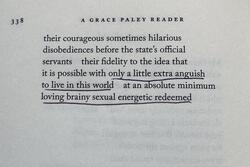Adding Irena Klepfisz to the Canon
In women’s studies classes, we spend a lot of time talking about power: who has it, who doesn’t, and how it moves. Power matters in literature, too, since those in power are the ones who shape the canons – the defined sets of literary works that represent a particular field. The root of the word is “bar” or “reed,” and it’s an easy metaphoric leap to think of texts outside of a particular canon as those that missed the bar. “Bar” also has another connotation, though. Bars keep things out and in. As a result, canons have the power to help define what is important – and what isn’t. That’s why so much feminist work has to do with challenging or expanding the canon by bringing new perspectives on an issue to the forefront.
But even feminists have to make decisions about inclusion and exclusion, and for every Jewish feminist group or individual that we are familiar with, there are probably twenty who we will never hear about. I thought I’d devote my blog post this week to one of those feminists – you won’t find too much about her on the JWA site, although she is a peer of many of the women featured on JWA’s Jewish Women and the Feminist Revolution exhibit . Consider it my (small) effort to expand this particular canon.
Her name is Irena Klepfisz. She is a poet and a professor – you can find her these days at Barnard College. Born in 1941, she is a child survivor of the Holocaust, a speaker of Yiddish, a poet, and a feminist. She was a major contributor to Evelyn Beck’s Nice Jewish Girls, an anthology of literature by Jewish lesbians, and in 1986, she published The Tribe of Dina: A Jewish Women’s Anthology together with Melanie Kaye/Kantrowitz. The Tribe of Dina was one of the first texts to bring together the perspectives and experiences of diverse but secular Jewish women, including lesbian, straight, Ashkenazi and Sephardi women from various class backgrounds. In their introduction to the anthology, Klepfisz and Kaye/Kantrowitz write about their awareness of the sexism in Jewish culture, and their desire “to present Jewish experience in which Jewish women are central” – in other words, to plant the seeds of a new Jewish literary canon. Klepfisz and Kaye/Kantrowitz were looking to allow Jewish women who identified with Jewish culture, if not always with Jewish religion, an opportunity to speak and be spoken to, to have their voices heard and to know that there were others to whom they could relate. In many ways, they succeeded. Of Klepfisz’s book of poetry Keeper of Accounts, Joan Nestle says the following: “I am an unaffiliated New York Jew without family or congregation: Irena Klepfisz is my schul, my cantor, my shabes candle. Her poetry is a religious text I can live with; it leads me not to a booming God but to small voices who shatter the ugliness of history.”
Nestle’s words to describe Klepfisz’s work and its impact on many Jewish women in the 1980’s are more powerful than any of mine. Here’s to a Jewish feminist who has brought light to women’s lives, and whose poetry and essays continue to challenge, expand, and disrupt the canon.






Rabbi Kosovske -- Muriel Rukeyser is in JWA's Jewish Women: A Comprehensive Historical Encyclopedia, check out her article.
Irena Klepfisz's writings had a profound impact on the formation of my Jewish feminist identity during college - thank you for this great post. Muriel Rukeyser (1913-1980) should also go to the head of the canon! In Our Time by Muriel Rukeyser In our period, they say there is free speech. They say, there is no penalty for poets, There is no penalty for writing poems. They say this. This is the penalty. (from "The Speed of Darkness," 1968) Here is a recording of her reading this poem: http://www.youtube.com/watch?v...